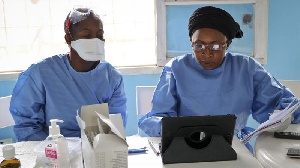I have been following the advice of the health authorities and avoiding trips outside home – unless it's absolutely necessary to do so.
I am glad to say that I've managed to go to only one major outside event and one private outing in the past two weeks. At both places, the anti-Covid protocols were fully observed and I was left in no fear that it might have been wrong for me have gone.
However, going to one of the events meant depending on a popular car-hire service for transport. My first objection – stated many times – to some of these car services is that the vehicles they use are so tiny that I feel unsafe whenever I travel in them.
Now, it's no use telling me that the cars have been certified as safe by experts in the countries where they are made. For neither Spain nor South Korea (from where most of these tin-boxes are imported) would tolerate road standards as atrocious as ours.
But even if our roads were up to standard, it's important that a passenger should feel safe and comfortable in a car. We cannot control our feelings: they arise from deep within us and are confirmed by empirical facts observed by us. In any case, most people are hard-wired to be neurotic. So we need the authorities to help us feel safe and not look away whilst we are forced to pay for services that put us in an uncomfortable mental condition!
This means that our licensing authorities should take psychological factors into consideration when allowing certain types of vehicles to be used for commercial purposes. It's a concern for public safety and public welfare that caused the authorities, even in colonial times, to ban certain wooden parts used in mammy lorries that were found to be causes of serious injury and death.
There were also social expectations in those days: those with a long memory will recall that young ambitious men chased after “Jaguar” cars and that Accra and Kumasi taxis were once noted, both for their quality and the comfortable rides they provided. The most popular car used for taxis in the pre-independence era and the years immediately after was the Morris Oxford Series 2. This car had leather seats. Yes – a taxi with leather seats!
So its competition had to have something else. And many did – for instance, fairly luxurious Opel Kapitans and Mercedes 180s could be seen being used as taxis – believe it or not!
Later on, Russian-made “Volga” cars were imported to be used as taxis. Unfortunately for our Government of the day (the CPP) the Volga cars had a rather high front-end, and when they were cruising, some people thought they looked like prancing horses! So, Ghanaians, known for their wicked sense of humour, rechristened the Volga cars “p?nk? ab? dam” [the horse has gone crazy!) Needless to say, they became uneconomical o run as taxis and were eventually sidelined.
Anyway, I became almost immediately angry when I got into the tiny car offered by a car-hire service to to take me out one afternoon. For when I asked the driver to help me to fasten my rather unbudgeable safety belt, he said to me: “If O fasten it, it will dirty your trousers!”
I looked at him with unbelievable eyes: “So you know it's dirty and yet you're on the road on a Sunday, when you know people like to dress well, using the car with a dirty safety belt to make money?” I asked. (Actually, he was partly lying: some of our drivers do think that if you use a safety belt “too often”, it gets “weak” and will need to be replaced! So they discourage the use of safety belts in their cars!)
Needless to say, all thought of enjoying myself that afternoon was driven from my mind and replaced with resentment at the stupidity, selfishness and lack of professionalism prevalent in so many of our commercial practices.
My heart was in my mouth all the way to my destination. Suppose the car was involved in a crash? Would I be tossed through the windscreen like a piece of dismembered – what?
Believe it or not, my return journey home was even worse. The car did not have air-condition and, without my knowing it, the driver had opened the window on my side.
“What's wrong with your air-conditioning?” I asked on noticing this. I knew from past experience that he would say the A.C. had “run out of gas” and that he would go and “refill” it next week.
But I was wrong! Instead, he gave me a completely novel excuse which previous drivers had never given to me: “The motor has stopped working,” he said.
I almost laughed. The motor? These car-service drivers now have verbal dexterity, right?!
I would have laughed and let the matter rest, except that when we entered a traffic jam, a persistent street-vendor poked his head right into the car – yes – and shouted into my breathing space, “Master,, buy some! Buy some!”
You've guessed it – the fellow was not wearing a face mask! And that threw me into an hour of uncomfortable neurotic contemplation of catching Covid-19!
I, therefore, applaud the President, Nana Addo Dankwa Akufo-Addo, for charging us (in his charge to us, in his 19th Covid-19 broadcast) not to let “our guard down” because we have heard that the second wave of Covid-19 had hit Europe and America, but fortunately, not ourselves. It might hit us too of we are not careful, the President warned.
He noted that three weeks ago, in his “Update No.18”, he had indicated that the number of recorded active Covid-19 cases (that is, persons with the virus) was “in decline” in Ghana. The statistics were “pointing to the fact that we were on the path towards defeating the virus.” So, our nation was becoming “accustomed to this downward slide of active cases.”
However, “in recent weeks, a gradual change in the trajectory of the virus” had been observed, the President acknowledged. There had been “an increase in active cases from the three hundred and ninety-eight (398) cases recorded three weeks ago, to one thousand, one hundred and thirty-nine (1,139) active cases, as at Friday, 6th November 2020”.
He gave further details to show that “the number of daily infections was on the rise, from an average of twenty-five (25) new cases per day then, to an average of over one hundred and thirty (130) new cases per day in the course of the last two weeks.”
These figures gave cause for concern – in view of what was happening in Europe and America, namely, “the outbreak of the second wave of infections” which was engulfing many other countries.
Over here, scientists at the West African Centre for Cell Biology of Infectious Pathogens of the University of Ghana, Legon, collaborating with the Noguchi Memorial Institute for Medical Research (who are studying the genetic make-up of the virus in Ghana) had established that the virus had not changed. Rather, it was “a reduction in compliance with the preventive protocols [that] accounts for the increase in infections.”
The President went on: “Fellow Ghanaians, it appears that we are letting our guard down. Now more than ever, we have to adhere to mask-wearing, hand-washing, the use of sanitizers, and social distancing protocols that have become a part of our daily routines, and which has ensured that we do not impose, all over again, the restrictions we are seeing in other parts of the world.”
So, it is over to us. We must relentlessly re-embark on our effort to contain COVID-19 at all costs. When we see the mistakes that certain Governments (such as the UK and the US, that have cost so many lives and economic loss) have made in their own approach to the problem, we must thank our luck stars that our own Government has demonstrated that it is up to the onerous task of ensuring our safety from the virus. We must therefore do our bit, as a populace, to support the Government's valiant efforts.
In return, we expect the Government to be ready, on its part, to unleash strict punishment on all those who insist on flouting the rules that ensure our collective safety. Without sanctions, some people will deliberately endanger others – such people as the fellow who poked his head into my car window to try and sell me something I didn't want!
We deserve protection from such irresponsible vendors, by our law enforcement agencies.
Opinions of Wednesday, 11 November 2020
Columnist: Cameron Duodu















